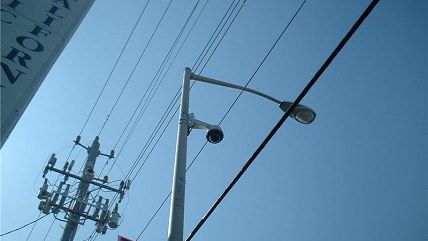Surveillance Sneaking Its Way Into Cities
ACLU 'model ordinance' would at least require a public debate

In 1966, the then-Supreme Court Justice William O. Douglas warned about an "alarming trend whereby the privacy and dignity of our citizens is being whittled away." Each step is imperceptible, he wrote, "but when viewed as a whole, there begins to emerge a… society in which government may intrude into the secret regions of man's life at will."
What would Douglas think about the post-9/11 world, where the National Security Agency conducts warrantless Internet searches and government agents track cellphone conversations from high-tech airplanes? The latter program, revealed last week by a Wall Street Journal report, has sparked little outcry.
Perhaps people feel powerless to confront federal programs. But a new effort hopes to empower them to confront local authorities who embrace similar technologies by prompting cities and counties to pass an ordinance requiring a public debate and oversight of any such new technologies.
Like most California communities, San Diego area officials employ many devices—license-plate readers, facial-recognition software, video-surveillance systems, etc. These technologies can have advantages—body cameras help monitor police interactions with the public, and can reduce misbehavior by the public and officers—but there's no question they impose a cost.
In a democratic society, shouldn't the public have a chance to debate these policies publicly before officials enact them?
Unfortunately, that's not always happening. "Local law enforcement has been taking advantage of millions of federal surveillance dollars streaming into California to sidestep the normal oversight process of city councils and boards of supervisors and keep the public in the dark about important community decisions," said Nicole Ozer, a director of the American Civil Liberties Union (ACLU) of California, in a statement.
The civil-liberties group has drafted a model ordinance for localities to consider. If the public doesn't even know that a local agency is, say, using drones or video cameras, then how can anyone make sure the collected data is not being misused? And the lack of a discussion up front can lead to an angry backlash later.
The ACLU points to Oakland, which sought to expand its "Domain Awareness Center" at its port into a citywide surveillance system. The central command would monitor the city's many cameras and stream data from federal law-enforcement computers. The stated goal was something right out of a dystopian movie, where the Department of Pre-Crime was watching everything. Eager for the federal dollars and worried about the city's crime problem, city officials pushed for the system without widespread public engagement. The resulting backlash killed the project. ACLU's "model ordinance" might force policymakers to answer some crucial questions before it leads to privacy and other concerns.
For instance, these projects are driven by "free" federal money, which makes it easy for localities to downplay any ongoing costs. The proposed ordinance would require cities that pass it to complete a Surveillance Impact Report that details "the fiscal costs for the surveillance technology, including initial purchase, personnel and other ongoing costs, and any current or potential sources of funding."
It's easy to see the value in that approach, in all areas of government, even when such an ordinance wouldn't directly apply. For instance, when the San Diego Unified School District agreed to take a $730,000 Mine Resistant Ambush Protected vehicle from the feds, it sparked an angry debate about the militarization of police forces that led to the tank-like vehicle's return. (As an aside, the district claimed it would cost only $500 a year to maintain. What happens if the transmission goes kaput?)
Such questions should be answered methodically before the fact. Such an ordinance would create legally enforceable guidelines and protections for the use and sharing of collected data. That's basic, especially given the California Highway Patrol's recent scandal involving allegations that officers shared racy photos of female suspects.
The best way to push back against the imperceptible expansion of monitoring is to make the process more perceptible. If such technologies have valuable uses, their advocates should have no problem convincing the public to support them.


Show Comments (72)